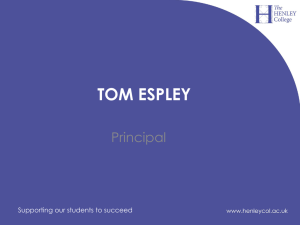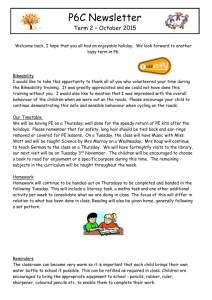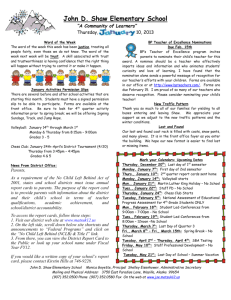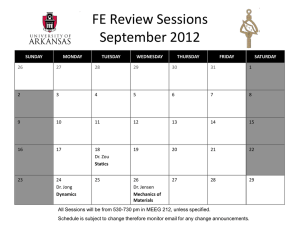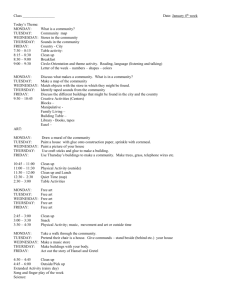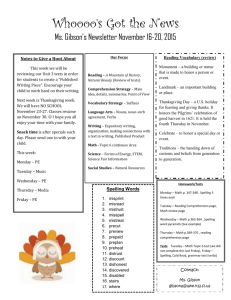89.1: Science and Media in Public Life
advertisement
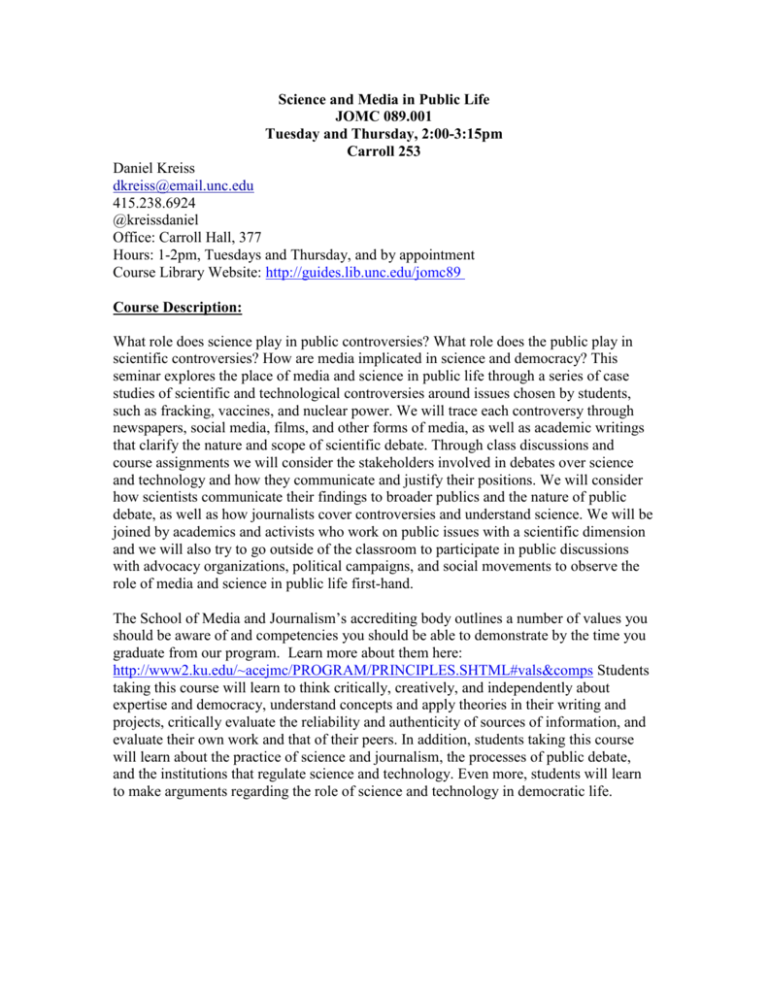
Science and Media in Public Life JOMC 089.001 Tuesday and Thursday, 2:00-3:15pm Carroll 253 Daniel Kreiss dkreiss@email.unc.edu 415.238.6924 @kreissdaniel Office: Carroll Hall, 377 Hours: 1-2pm, Tuesdays and Thursday, and by appointment Course Library Website: http://guides.lib.unc.edu/jomc89 Course Description: What role does science play in public controversies? What role does the public play in scientific controversies? How are media implicated in science and democracy? This seminar explores the place of media and science in public life through a series of case studies of scientific and technological controversies around issues chosen by students, such as fracking, vaccines, and nuclear power. We will trace each controversy through newspapers, social media, films, and other forms of media, as well as academic writings that clarify the nature and scope of scientific debate. Through class discussions and course assignments we will consider the stakeholders involved in debates over science and technology and how they communicate and justify their positions. We will consider how scientists communicate their findings to broader publics and the nature of public debate, as well as how journalists cover controversies and understand science. We will be joined by academics and activists who work on public issues with a scientific dimension and we will also try to go outside of the classroom to participate in public discussions with advocacy organizations, political campaigns, and social movements to observe the role of media and science in public life first-hand. The School of Media and Journalism’s accrediting body outlines a number of values you should be aware of and competencies you should be able to demonstrate by the time you graduate from our program. Learn more about them here: http://www2.ku.edu/~acejmc/PROGRAM/PRINCIPLES.SHTML#vals&comps Students taking this course will learn to think critically, creatively, and independently about expertise and democracy, understand concepts and apply theories in their writing and projects, critically evaluate the reliability and authenticity of sources of information, and evaluate their own work and that of their peers. In addition, students taking this course will learn about the practice of science and journalism, the processes of public debate, and the institutions that regulate science and technology. Even more, students will learn to make arguments regarding the role of science and technology in democratic life. Book: Naomi Oreskes and Erik M. Conway. 2010. Merchants of Doubt: How a Handful of Scientists Obscured the Truth on Issues from Tobacco Smoke to Global Warming. New York: Bloomsbury Press. Assignments: Engaged participation: As a seminar, this course is discussion based. Each student is expected to come to class having completed and thought about the day’s reading. Students are required to post at least one, 200-word response comment to the readings each week on the online discussion board. These are due the evening before the start of class (Monday or Wednesday by 8pm). Students are responsible for ‘opening’ at least one text during the semester. This entails a more formal presentation that summarizes the key arguments of the text and commences class discussion. Signups will be on Sakai. In addition, students are expected to follow daily media coverage of the 2016 presidential election and other elections across the country, as well as stay up to date on national media coverage of scientific and technological controversies. We will often begin each class period by discussing issues about science and technology that are discussed in the news media. Experiential Learning Activities: Throughout the semester, we will be visited by, and hopefully visiting, a number of scientists, advocacy organizations, public officials, and journalists. Students are expected to attend class on these days and research the backgrounds of the speakers and organizations we are visiting. Case Studies and Writing Assignments: During the semester, students will be responsible for working in groups and leading three class periods on a scientific or technological controversy of their choosing. Topics may include: fracking, vaccines, nuclear power, health care, stem cells, genetically-modified food, etc. Student groups are responsible for choosing the issues, researching the topic, compiling accessible science writing and journalistic coverage of the issue for class readings, identifying potential speakers or trips, and analyzing the case. During the semester students will complete one five-page, double-spaced ‘reaction’ paper in response to a controversy that students presented in class. These are due the Thursday the week after we discuss the issue. Term Paper: The final paper consists of a 10-15 page term paper and final presentation. Students will analyze a public debate (historical or contemporary) of their own choosing that relates to the social or natural sciences or a technological controversy. It must be on a topic not discussed in the course and is subject to the approval of the professor. Term papers should analyze the nature of the controversy, its timeline, how it was covered in the professional press and media more broadly, the stakeholders involved and how they framed their arguments, and make an argument about how the public should understand the nature of the debate. Students are welcome, and encouraged, to work in groups on the final paper. To familiarize students with a core practice of the sciences, and help them improve their work, students must submit a draft of their final paper to a group of their peers for comments. Students will also be responsible for providing feedback on the work of one of their peers (individually). Comments should engage critically with all aspects of the paper, and look for weaknesses in the work so the author can correct them and make the paper stronger as a result. Students are expected to revise their papers based on the comments of their peers. First drafts of papers should be submitted for peer review by 12/1. Peer review comments are due on 12/4. The final papers and presentations are due at a time to be discussed in class. Grading: The course grade has the following components: Participation (including discussion and posts) Reaction paper Final term paper, presentation, and peer review 40% 20% 40% Special Accommodations: If you require special accommodations to attend or participate in this course, please let the instructor know as soon as possible. If you need information about disabilities visit the Accessibility Services website at https://accessibility.unc.edu/ Honor Code: I expect that each student will conduct himself or herself within the guidelines of the University honor system (http://honor.unc.edu). All academic work should be done with the high levels of honesty and integrity that this University demands. You are expected to produce your own work in this class. If you have any questions about your responsibility or your instructor’s responsibility as a faculty member under the Honor Code, please see the course instructor or Senior Associate Dean Charlie Tuggle, or you may speak with a representative of the Student Attorney Office or the Office of the Dean of Students. Seeking Help: If you need individual assistance, it’s your responsibility to meet with the instructor. If you are serious about wanting to improve your performance in the course, the time to seek help is as soon as you are aware of the problem – whether the problem is difficulty with course material, a disability, or an illness. Diversity: The University’s policy on Prohibiting Harassment and Discrimination is outlined in the 2011-2012 Undergraduate Bulletin http://www.unc.edu/ugradbulletin/. UNC is committed to providing an inclusive and welcoming environment for all members of our community and does not discriminate in offering access to its educational programs and activities on the basis of age, gender, race, color, national origin, religion, creed, disability, veteran’s status, sexual orientation, gender identity, or gender expression. Special Accommodations: If you require special accommodations to attend or participate in this course, please let the instructor know as soon as possible. If you need information about disabilities visit the Department of Disability Services website at http://disabilityservices.unc.edu/ Course Schedule Week One: Welcome to UNC and Introducing the Course Tuesday, August 18th Introductions to the course and each other Thursday, August 20st Merchants of Doubt, Introduction and Chapter 1 “Coca-Cola Funds Scientists Who Shift Blame for Obesity Away from Bad Diets.” http://well.blogs.nytimes.com/2015/08/09/coca-cola-funds-scientists-who-shift-blamefor-obesity-away-from-bad-diets/?smprod=nytcore-iphone&smid=nytcore-iphone-share Weeks 2-3: What is science? What is the relationship between science and media? Tuesday, August 25th Bruno Latour, Opening Pandora’s Black Box, from Science in Action (pages 1-17) Available online at: http://cscs.res.in/dataarchive/textfiles/textfile.2008-08-19.0976973208/file Thursday, August 27th Merchants of Doubt, Chapters 2, 5, and 6 Tuesday, September 1st Merchants of Doubt, Chapter 7, Conclusion, and Epilogue Thursday, September 3rd Guest Lecture: The Science and Debate Over Fracking Kylah Hedding, Ph.D. Student, UNC School of Media and Journalism Readings to be announced Weeks 4 and 5: Making Issues Public in a Digital Age Tuesday, September 8th State of the News Media 2015 Available online at: http://www.journalism.org/2015/04/29/state-of-the-news-media-2015/ Thursday, September 10th Sharon Dunwoody, “Science Journalism: Prospects in the Digital Age. ” Available online at: http://bit.ly/1hfKr4l S. Holly Stocking and Lisa W. Holstein, “Manufacturing Doubt: journalists’ roles and the construction of ignorance in a scientific controversy,” Public Understanding of Science, 2009 Tuesday, September 15th Assignment: Come prepared to discuss cases Esther Laslo, Ayelet Baram-Tsabari, and Bruce Lewenstein, “A Growth Medium for the Message: Online Science Journalism Affordances for Exploring Public Discourse of Science and Ethics.” Available online at: http://edu.technion.ac.il/docs/Laslo,_BaramTsabari_and_Lewenstein_2011.pdf Thursday, September 17th Dan Kahan, “What is the Science of Science Communication.” Available online at: http://www.culturalcognition.net/browse-papers/what-is-the-science-of-sciencecommunication.html Nature Neuroscience, “The Perils of Public Debate” http://www.nature.com/neuro/journal/v8/n5/full/nn0505-535.html Weeks 6-8: Debating Climate Change: Consensus and Doubt Tuesday, September 22nd Naomi Oreskes, “The Scientific Consensus on Climate Change” Available online at: http://www.sciencemag.org/content/306/5702/1686.full.pdf&embedded=true Aaron M. McCright and Riley E. Dunlap, “The Politicization of Climate Change and Polarization in the American Public’s Views of Global Warming, 2001-2010,” The Sociological Quarterly, 2011 Thursday, September 24th Guest Lecture: Janas Sinclair, Associate Professor, School of Media and Journalism. Readings to be announced Tuesday, September 29th Anne M. McCright and Riley E. Dunlap, “Defeating Kyoto: The Conservative Movement’s Impact on U.S. Climate Change Policy,” Available online at: http://www.res.ku.edu/~crgc/NSFWorkshop/Readings/Defeating%20Kyoto.pdf Thursday, October 1st Susan Moser, “Communicating Climate Change: history, challenges, process and future directions.” Available online: http://web.env.auckland.ac.nz/courses/geog320/resources/pdf/climate/Moser%202009.pd f Matthew Nisbet, “Communicating Climate Change: Why Frames Matter for Climate Change.” Available online at: http://bit.ly/1AkAJBG Tuesday, October 6th Richard Holliman, “Advocacy in the Tail: Exploring the Implications of ‘Climategate’ for Science Journalism and Public Debate in the Digital Age” Journalism, 2011 Thursday, October 8th Alexandra Segerberg and W. Lance Bennett, “Social Media and the Organization of Collective Action: Using Twitter to Explore the Ecologies of Two Climate Change Protests,” The Communication Review, 2011. Week 9: Case Study One Tuesday, October 13th Thursday, October 15th No Class, Fall Break Week 10: Case Study One, Continued Tuesday, October 20th Thursday, October 22nd Week 11: Case Study Two Tuesday, October 27th Thursday, October 29th Week 12: Case Study Two and Three Tuesday, November 3rd Thursday, November 5th Week 13: Case Study Three Tuesday, November 10th Thursday, November 12th Week 14: Case Study Four Tuesday, November 17th Thursday, November 19th Week 15: Case Study Four Tuesday, November 24th Thursday, November 26th No Class: Thanksgiving Holiday Week 16: The Stakes Tuesday, December 1st Jared Diamond, Collapse: How Do Societies Choose or Fail to Succeed Read chapter 14, “Why Do Some Societies Make Disastrous Decisions?” and chapter 16, “The World as a Polder: What Does it All Mean to Us Today?” Available online at: http://bit.ly/1sKdqjT Deadline for submission of final paper drafts for peer review Friday, December 4th Peer review comments due Final Paper and Presentations To be determined

